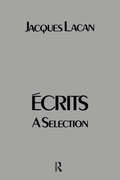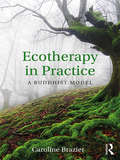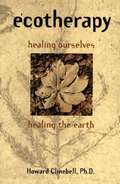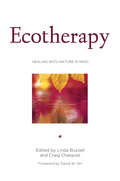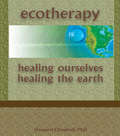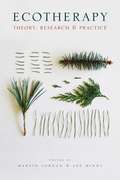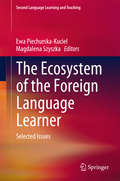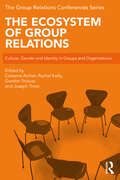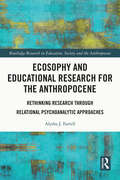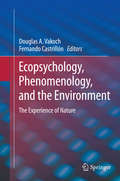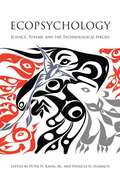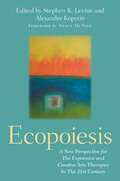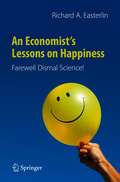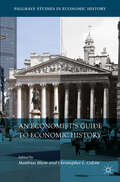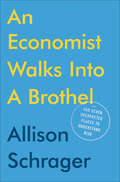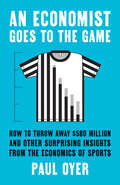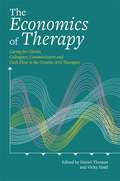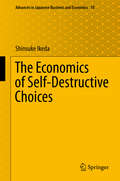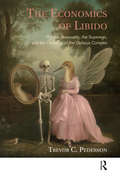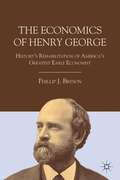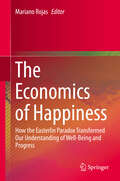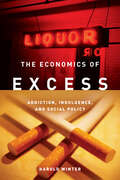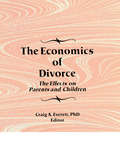- Table View
- List View
Ecrits: A Selection
by Jacques LacanGenius and charismatic leader of a psychoanalytic movement that in the 1950s and 1960s provided a focal point for the French intelligentsia, Jacques Lacan attracted a cult following. Ecrits is his most important work, bringing together twenty-seven articles and lectures originally published between 1936 and 1966. Following its first publication in 1966, the book gained Lacan international attention and exercised a powerful influence on contemporary intellectual life. To this day, Lacan's radical, brilliant and complex ideas continue to be highly influential in everything from film theory to art history and literary criticism. Ecrits is the essential source for anyone who seeks to understand this seminal thinker and his influence on contemporary thought and culture.
Ecotherapy in Practice: A Buddhist Model
by Caroline BrazierEcotherapy in Practice reflects the growing interest and research in this field. Drawing on a diversity of experience from the counselling and psychotherapy professions, but also from practitioners in community work, mental health and education, this book explores the exciting and innovative possibilities involved in practising outdoors. Caroline Brazier brings to bear her experience and knowledge as a psychotherapist, group worker and trainer over several decades to think about therapeutic work outdoors in all its forms. The book presents a model of ecotherapy based on principles drawn from Buddhist psychology and Western psychotherapy which focuses particularly on the relationship between person and environment at three levels, moving from the personal level of individual history to cultural influences, then finally to global circumstances, all of which condition mind-states and psychological wellbeing. Ecotherapy in Practice will provide refreshing and valuable reading for psychotherapists and counsellors in the field, those interested in Buddhism, and other mental health and health professionals working outdoors
Ecotherapy: Healing Ourselves, Healing the Earth
by Robert AndersonHere is a trailblazing book on issues of vital interest to the future of humankind. Ecotherapy: Healing Ourselves, Healing the Earth sheds light on humankind’s most serious health challenge ever--how to save our precious planet as a clean, viable habitat. As a guide for therapists, health professionals, pastoral counselors, teachers, medical healers, and especially parents, Ecotherapy: Healing Ourselves, Healing the Earth highlights readers’strategic opportunities to help our endangered human species cope constructively with the unprecedented challenge of saving a healthful planet for future generations. <p><p> Ecotherapy: Healing Ourselves, Healing the Earth introduces readers to an innovative approach to ecologically-grounded personality theory, spirituality, ecotherapy, and education. The book shares the author’s well-developed theories and methods of ecological diagnosis, treatment, and education so professionals and parents, our most influential teachers, can rise to the challenge of saving our planet. <p> A systematic theory and practice guidebook, Ecotherapy: Healing Ourselves, Healing the Earth fills a wide gap in both the counseling and therapy literature and the ecology literature. It offers an innovative model for fulfilling the “ecological circle” between humans and nature with three action dimensions. These are self-care by being intentionally nurtured by nature; spiritual enrichment by enjoying the transcendent Spirit in nature; and responding by nurturing nature more responsibly and lovingly. <p> The theories and practical applications presented in the book come together to explore long-overlooked issues at the boundary between human health and the health of the natural environment. Psychotherapists, health professionals, and teachers; pastoral counselors and other clergy who counsel and teach; laypersons who are parents and grandparents; and individuals and groups interested in environmental issues will find Ecotherapy: Healing Ourselves, Healing the Earth essential for approaching the long-neglected earthy roots of the total human mind-body-spirit organism.
Ecotherapy: Healing with Nature in Mind
by Linda Buzzell Craig ChalquistIn the 14 years since Sierra Club Books published Theodore Roszak, Mary E. Gomes, and Allen D. Kanner's groundbreaking anthology, Ecopsychology: Restoring the Earth, Healing the Mind, the editors of this new volume have often been asked: Where can I find out more about the psyche-world connection? How can I do hands-on work in this area? Ecotherapy was compiled to answer these and other urgent questions.Ecotherapy, or applied ecopsychology, encompasses a broad range of nature-based methods of psychological healing, grounded in the crucial fact that people are inseparable from the rest of nature and nurtured by healthy interaction with the Earth. Leaders in the field, including Robert Greenway, and Mary Watkins, contribute essays that take into account the latest scientific understandings and the deepest indigenous wisdom. Other key thinkers, from Bill McKibben to Richard Louv to Joanna Macy, explore the links among ecotherapy, spiritual development, and restoring community.As mental-health professionals find themselves challenged to provide hard evidence that their practices actually work, and as costs for traditional modes of psychotherapy rise rapidly out of sight, this book offers practitioners and interested lay readers alike a spectrum of safe, effective alternative approaches backed by a growing body of research.
Ecotherapy: Healing Ourselves, Healing the Earth
by Howard ClinebellHere is a trailblazing book on issues of vital interest to the future of humankind. Ecotherapy: Healing Ourselves, Healing the Earth sheds light on humankind’s most serious health challenge ever--how to save our precious planet as a clean, viable habitat. As a guide for therapists, health professionals, pastoral counselors, teachers, medical healers, and especially parents, Ecotherapy: Healing Ourselves, Healing the Earth highlights readers’strategic opportunities to help our endangered human species cope constructively with the unprecedented challenge of saving a healthful planet for future generations.Ecotherapy: Healing Ourselves, Healing the Earth introduces readers to an innovative approach to ecologically-grounded personality theory, spirituality, ecotherapy, and education. The book shares the author’s well-developed theories and methods of ecological diagnosis, treatment, and education so professionals and parents, our most influential teachers, can rise to the challenge of saving our planet. Readers will find that the book helps them accomplish this goal as it: explores an expanded, ecologically grounded theory of personality development, the missing dimension in understanding human identity formation outlines a model for doing ecologically oriented psychotherapy, counseling, medical healing, teaching, and parenting describes life-saving perspectives for making one’s lifestyle more earth-caring demonstrates the importance of hope, humor, and love suggests how these earthy approaches may be utilized in a variety of social contexts and cultures A systematic theory and practice guidebook, Ecotherapy: Healing Ourselves, Healing the Earth fills a wide gap in both the counseling and therapy literature and the ecology literature. It offers an innovative model for fulfilling the “ecological circle” between humans and nature with three action dimensions. These are self-care by being intentionally nurtured by nature; spiritual enrichment by enjoying the transcendent Spirit in nature; and responding by nurturing nature more responsibly and lovingly.The theories and practical applications presented in the book come together to explore long-overlooked issues at the boundary between human health and the health of the natural environment. Psychotherapists, health professionals, and teachers; pastoral counselors and other clergy who counsel and teach; laypersons who are parents and grandparents; and individuals and groups interested in environmental issues will find Ecotherapy: Healing Ourselves, Healing the Earth essential for approaching the long-neglected earthy roots of the total human mind-body-spirit organism.
Ecotherapy: Theory, Research and Practice (First Edition)
by Martin Jordan Joe HindsThe idea of using nature to improve mental and emotional wellbeing has existed for many years, in many forms. However, growing levels of interest in holistic, reciprocal relationships with nature have led to the development of an explicit field, termed Ecotherapy. <P><P>In this book, Martin Jordan and Joe Hinds provide a comprehensive exploration of this emerging area of practice. <P><P>The book offers, in three parts, a unique examination of a range of theoretical perspectives, unpacks the latest research and provides a wealth of illuminating practice examples, with a number of chapters dedicated to authors' own first-hand experiences of the positive psychological effects of having contact with nature.
The Ecosystem of the Foreign Language Learner
by Ewa Piechurska-Kuciel Magdalena SzyszkaThis volume examines selected aspects of the foreign language learning process from an ecological perspective, adopting a holistic view on complex interrelations among and within organisms (L2 language learners) and their milieus (family, school and society). First of all, the personal ecosystem of the learner is taken into consideration, whereby two powerful influences are intertwined: cognitive and affective aspects. The learning space formed by the individual is largely shaped by their affective states coexisting in conjunction with their cognitive processes. Moreover, this specific space is also modified by a wider array of other personal ecosystems or those of cultures. Hence, the ecosystem of the foreign language learner is also subject to influences coming from sociocultural leverage that can be represented by people they know, like parents and language teachers, who can both directly and indirectly manipulate their ecosystem. At the same time other important forces, such as culture as a ubiquitous element in the foreign language learning process, also have the power to shape that ecosystem. Accordingly, the book is divided into three parts covering a range of topics related to these basic dimensions of foreign language acquisition (the cognitive, affective and socio-cultural). Part I, Affective Interconnections, focuses on the body of original empirical research into the affective domain of not only L2 language learners but also non-native language teachers. Part II, Cognitive Interconnections, reports on contributions on language learners' linguistic processing and cognitive representations of concepts. The closing part, Socio-cultural Interconnections, provides new insights into language learning processes as they are affected by social and cultural factors.
The Ecosystem of Group Relations: Culture, Gender and Identity in Groups and Organizations (The Group Relations Conferences Series)
by Coreene Archer Rachel Kelly Gordon Strauss Joseph TriestThe unconscious dynamics that surface in groups when authority is exercised are of paramount importance in Group Relations Conferences; this volume addresses these considerations through research findings and speculation on the future of Group Relations both within conferences and outside of them. This is the sixth instalment in a series of books based on Tavistock Group Relations Conferences and contains a collection of papers presented at the sixth Belgirate conference. Combining chapters on theory and practice, this volume delivers a meditation on the relationships between the physical spaces we inhabit or co-create, the psychic, inner or spiritual space and the liminal space in-between. Group Relations provides a window of understanding into why inequity and intergroup hostilities pervade the modern world alongside a method that illuminates how people consciously and unconsciously contribute to these tensions, whether personally, in groups or in organisations. This will be an invaluable resource for practitioners, academics, and scholars of Group Relations, as well as managers and organisational members wanting to learn more about how Group Relations methods can contribute to their organisational success.
Ecosophy and Educational Research for the Anthropocene: Rethinking Research through Relational Psychoanalytic Approaches (Routledge Research in Education, Society and the Anthropocene)
by Alysha J. FarrellProblematizing the aims of education in the Anthropocene, this text illustrates the value of relational psychoanalytic theory in the study and practice of education amidst the climate crisis. Illustrating how dominant educational theory fails to acknowledge climate precarity and the consequences of living beyond the Earth’s carrying capacity, Ecosophy and Educational Research for the Anthropocene calls for a reorientation of scholarship to decentre the human subject. The author discusses the evolution of intersubjective psychoanalysis to make a case for a turn to relational and psychoanalytically informed educational research. Chapters foreground areas for educational researchers to consider in pursuing intersubjective inquiries into the affective dimensions of curriculum and pedagogy to foster an emergence of eco-attunement and ecosophical educational research (EER). By framing an ecosophical approach, this book enables educational leaders, researchers and educators to fulfil their responsibility to engage in educational praxis which is contextually responsive, relationally attuned and recognizant that we cannot be studied apart from our connections to the planet.
Ecopsychology, Phenomenology, and the Environment
by Douglas A. Vakoch Fernando CastrillónThis book seeks to confront an apparent contradiction: that while we are constantly attending to environmental issues, we seem to be woefully out of touch with nature. The goal of Ecopsychology, Phenomenology and the Environment is to foster an enhanced awareness of nature that can lead us to new ways of relating to the environment, ultimately yielding more sustainable patterns of living. This volume is different from other books in the rapidly growing field of ecopsychology in its emphasis on phenomenological approaches, building on the work of phenomenological psychologists such as Maurice Merleau-Ponty. This focus on phenomenological methodologies for articulating our direct experience of nature serves as a critical complement to the usual methodologies of environmental and conservation psychologists, who have emphasized quantitative research. Moreover, Ecopsychology, Phenomenology and the Environment is distinctive insofar as chapters by phenomenologically-sophisticated ecopsychologists are complemented by chapters written by phenomenological researchers of environmental issues with backgrounds in philosophy and geology, providing a breadth and depth of perspective not found in other works written exclusively by psychologists.
Ecopsychology: Science, Totems, and the Technological Species
by Patricia H. Hasbach Peter H. Kahn Jr.We need nature for our physical and psychological well-being. Our actions reflect this when we turn to beloved pets for companionship, vacation in spots of natural splendor, or spend hours working in the garden. Yet we are also a technological species and have been since we fashioned tools out of stone. Thus one of this century's central challenges is to embrace our kinship with a more-than-human world--"our totemic self"--and integrate that kinship with our scientific culture and technological selves. This book takes on that challenge and proposes a reenvisioned ecopsychology. Contributors consider such topics as the innate tendency for people to bond with local place; a meaningful nature language; the epidemiological evidence for the health benefits of nature interaction; the theory and practice of ecotherapy; Gaia theory; ecovillages; the neuroscience of perceiving natural beauty; and sacred geography. Taken together, the essays offer a vision for human flourishing and for a more grounded and realistic environmental psychology.
Ecopsychology: Restoring the Earth, Healing the Mind
by Theodore Roszak Mary E. Gomes Allen D. Kanner"A breakthrough book. It makes crystal clear that the natural world is not just an `environment' around us, but it is us, existing inside our souls and minds."--Jerry Mander "A very exciting book of enormous interest for everyone concerned with the future of our species--environmentalists and legislators, industrialists and educators, you and me. Its message should become part of Western thought."--Jane Goodall --This text refers to the Paperback edition.
Ecopoiesis: A New Perspective for The Expressive and Creative Arts Therapies In The 21st Century
by Stephen K. Levine and Alexander KopytinThis book emphasises ecological, nature-assisted expressive and creative arts and art therapies within the context of the current ecological crises. Rich in fresh theoretical perspectives, this timely compendium of theory, research, and practice also provides methods and tools that can help the reader understand and incorporate new eco perspectives into their work.Building on the concept of poiesis as the human creative function, this book seeks to stress the importance of humanity's ecopoietic capacity, creating a more sustainable life for humans. It has been specifically created within the context of this most critical period of human existence, and acts as a forum for innovation based on the values of the environmental movement and its desire to address the extensive sociopsychological impact of the ecological crisis.
An Economist’s Lessons on Happiness: Farewell Dismal Science!
by Richard A. EasterlinOnce called the “dismal science,” economics now offers prescriptions for improving people’s happiness. In this book Richard Easterlin, the “father of happiness economics,” draws on a half-century of his own research and that conducted by fellow economists and psychologists to answer in plain language questions like: Can happiness be measured? Will more money make me happier? What about finding a partner? Getting married? Having a baby? More exercise? Does religion help? Who is happier—women or men, young or old, rich or poor? How does happiness change as we go through different stages of life? Public policy is also in the mix: Can the government increase people’s happiness? Should the government increase their happiness? Which countries are the happiest and why? Does a country need to be rich to be happy? Does economic growth improve the human lot? Some of the answers are surprising (no, more money won’t do the trick; neither will economic growth; babies are a mixed blessing!), but they are all based on reason and well-vetted evidence from the fields of economics and psychology. In closing, Easterlin traces the genesis of the ongoing “Happiness Revolution” and considers its implications for people’s lives down the road.
An Economist’s Guide to Economic History (Palgrave Studies in Economic History)
by Matthias Blum Christopher L. ColvinWithout economic history, economics runs the risk of being too abstract or parochial, of failing to notice precedents, trends and cycles, of overlooking the long-run and thus misunderstanding ‘how we got here’. Recent financial and economic crises illustrate spectacularly how the economics profession has not learnt from its past.This important and unique book addresses this problem by demonstrating the power of historical thinking in economic research. Concise chapters guide economics lecturers and their students through the field of economic history, demonstrating the use of historical thinking in economic research, and advising them on how they can actively engage with economic history in their teaching and learning.Blum and Colvin bring together important voices in the field to show readers how they can use their existing economics training to explore different facets of economic history. Each chapter introduces a question or topic, historical context or research method and explores how they can be used in economics scholarship and pedagogy. In a century characterised to date by economic uncertainty, bubbles and crashes, An Economist’s Guide to Economic History is essential reading.For further information visit http://www.blumandcolvin.org
An Economist Walks into a Brothel: And Other Unexpected Places to Understand Risk
by Allison SchragerIs it worth swimming in shark-infested waters to surf a 50-foot, career-record wave?Is it riskier to make an action movie or a horror movie?Should sex workers forfeit 50 percent of their income for added security or take a chance and keep the extra money?Most people wouldn't expect an economist to have an answer to these questions--or to other questions of daily life, such as who to date or how early to leave for the airport. But those people haven't met Allison Schrager, an economist and award-winning journalist who has spent her career examining how people manage risk in their lives and careers. Whether we realize it or not, we all take risks large and small every day. Even the most cautious among us cannot opt out--the question is always which risks to take, not whether to take them at all. What most of us don't know is how to measure those risks and maximize the chances of getting what we want out of life.In An Economist Walks into a Brothel, Schrager equips readers with five principles for dealing with risk, principles used by some of the world's most interesting risk takers. For instance, she interviews a professional poker player about how to stay rational when the stakes are high, a paparazzo in Manhattan about how to spot different kinds of risk, horse breeders in Kentucky about how to diversify risk and minimize losses, and a war general who led troops in Iraq about how to prepare for what we don't see coming.When you start to look at risky decisions through Schrager's new framework, you can increase the upside to any situation and better mitigate the downsides.
An Economist Goes to the Game: How to Throw Away $580 Million and Other Surprising Insights from the Economics of Sports
by Paul OyerAn engaging look at the ways economic thinking can help us understand how sports work both on and off the field Are ticket scalpers good for teams? Should parents push their kids to excel at sports? Why do Koreans dominate women’s golf, while Kenyans and Ethiopians dominate marathon racing? Why would Michael Jordan, the greatest player in basketball, pass to Steve Kerr for the game-winning shot? Paul Oyer shows the many ways economics permeates the world of sports. His topics range from the business of sport to how great athletes use economic thinking to outsmart their opponents to why the world's greatest sports powerhouse (at least per capita) is not America or China but the principality of Liechtenstein. Economics explains why some sports cannot stop the use of performance-enhancing drugs while others can, why hundred-million-dollar player contracts are guaranteed in baseball but not in football, how one man was able to set the world of sports betting on its ear—and why it will probably never happen again. This book is an entertaining guide to how a bit of economics can make you a better athlete and a more informed fan.
The Economics of Therapy: Caring for Clients, Colleagues, Commissioners and Cash-Flow in the Creative Arts Therapies
by Alison Ledger Brynjulf Stige Daniel Thomas Elaine Matthews Venter Elena Fitzthum Kingman Chung Monika Geretsegger Petra Kern Rebecca Zarate Stine Lindahl Jacobsen Thomas Stegemann Vicky AbadWhen you think of arts therapy, you don't often associate the practice with profit; however, ethical economic models are essential in allowing clients the most access to arts therapy services. Art therapists don't generally have formal training in economics, which can be challenging when developing their professional services. This book offers the fundamentals of micro and macro economics that apply to creating a sustainable and ethical business model that supports the development of the arts therapies profession worldwide. Through economic theory and international case studies, the authors consider the business side of therapeutic arts service with recommendations for developing an ethical and sustainable practice. With key insights and informative examples, this book will serve as a guide for small business owners looking to develop their arts therapy practice.
The Economics of Self-Destructive Choices
by Shinsuke IkedaBased on recent advances in economics, especially those in behavioral economics, this book elucidates theoretically and empirically the mechanism of time-inconsistent decision making that leads to various forms of self-destructive behavior. The topics include over-eating and obesity, over-spending, over-borrowing, under-saving, procrastination, smoking, gambling, over-drinking, and other intemperate behaviors, all of which relate to serious social problems in advanced countries. In this book, the author attempts to construct a bridge between the basic theory of time discounting, especially as of hyperbolic discounting, and empirically observed "irrational (non-classical)" behavior in the various contexts just mentioned. The empirical validity of the theory is discussed using unique micro data as well as public macro data. The book proposes prescriptions for individual decision makers, whether sophisticated or naïve, to make better choices in self-control problems, and also provides policy makers with useful advice for influencing people's decision making in the right directions. This work is recommended not only to general readers who seek to learn how to attain better self-regulation under self-control problems. It also helps researchers who seek an overview of positive and normative implications of hyperbolic discounting, and thereby reconstruct economic theory for a better understanding of actual human behavior and the resulting economic dynamics .
The Economics of Libido: Psychic Bisexuality, the Superego, and the Centrality of the Oedipus Complex
by Trevor C. PedersonThis book is an attempt to get beyond pluralism by embedding psychoanalysis in philosophy and returning to Freud qua psychologist to link the depths of the mind to its surface. Beginning with the proposition that egoism and altruism are a more accurate representation of the binary of activity and passivity, The Economics of Libido revisits Freud's work to contextualize his central concepts and expand upon them. Egoism and altruism are further divided into masculine and feminine drives which can exist in either sex due to psychic bisexuality. The author's Freud places the Oedipus complex as the height of personal happiness in striving for passionate love or success while maturing through a series of educators and mentors. The subsequent father complex is snatched from obscurity as the recreation of the parental incest taboo amongst siblings. The ideal of commitment in relationships, fairness in one's dealings with peers, and Freud's emphasis on the non-universality of guilt are given their proper weight in his model.
The Economics of Henry George
by Phillip J. BrysonHenry George the greatest, most famous and most rejected of early American economists who trained himself in classical economics and developed a theory of a 'single tax'. There is much literature on many specific facets and aspects of George's work, but we lack a book which provides an overview of George's economics. . . until now!
The Economics of Happiness: How the Easterlin Paradox Transformed Our Understanding of Well-Being and Progress
by Mariano RojasThis book presents a panoramic view of the implications from Richard Easterlin’s groundbreaking work on happiness and economics. Contributions in the book show the relevance of the Easterlin Paradox to main areas, such as the relationship between income and happiness, the relationship between economic growth and well-being, conceptions of progress and development, design and evaluation of policies for well-being, and the use of happiness research to address welfare economics issues. This book is unique in the sense that it gathers contributions from senior and top researchers in the economics of happiness, whom have played a central role in the consolidation of happiness economics, as well as promising young scholars, showing the current dynamism and consolidation of happiness economics.
The Economics of Freedom
by Sebastiano Bavetta Pietro NavarraWhat is freedom? Can we measure it? Does it affect policy? This book develops an original measure of freedom called "Autonomy Freedom," consistent with J. S. Mill's view of autonomy, and applies it to issues in policy and political design. The work pursues three aims. First, it extends classical liberalism beyond exclusive reliance on negative freedom so as to take autonomous behavior explicitly into account. Second, it grounds on firm conceptual foundations a new standard in the measurement of freedom that can be fruitfully coupled with existing gauges. Third, it shows empirically that individual preferences for redistribution and cross-country differences in welfare spending in Organisation for Economic Co-operation and Development (OECD) countries are driven by the degree of "autonomy freedom" that individuals enjoy. By means of an interdisciplinary approach and a sophisticated econometric methodology, the book takes an explicit stand in defense of freedom and sets the basis for a liberalism based upon people's actions and institutions.
The Economics of Excess: Addiction, Indulgence, and Social Policy
by Harold WinterThe Economics of Excess discusses both standard and behavioral economics as they apply to addiction, indulgence, and social policy. Chapter One provides a thorough discussion of economic models of addiction. The model developed in most detail takes into account both standard and behavioral approaches. The next three chapters examine specific indulgences: smoking, drinking, and overeating. The heart of this book is its comprehensive discussion of what is often referred to as the "new paternalism. " Many economists are now challenging the more traditional belief that, unless they are harming others, people should be left to their own indulgences. As more and more economists are arguing for policies that are designed to protect people from themselves, this book offers a serious, yet accessible, discussion of the pros and cons of such interventions. Written in an approachable style, this book will serve researchers who are new to the economics of addiction and students in a variety of economics and policy courses alike.
The Economics of Divorce: The Effects on Parents and Children
by Craig EverettThe Economics of Divorce recognizes the critical role economic factors play during and after the divorce process. In the past, research into this issue has remained very general despite the enormous weight economics put on the entire divorce process. This book concentrates on elements specifically relevant to the economic variables of divorce. It focuses on the issues of work, employment, and financial support after divorce and how these issues affect the parents, children, and home environments of divorced families. The research presented not only provides insights into the economic aspects of divorce, but it is also invaluable to the entire study of divorce and remarriage as it explores the personal impact of these issues.Geared toward anyone working with divorced families, whether they are clinicians, educators, mediators, or attorneys, The Economics of Divorce is also of use to members of divorced or remarried families. The book contains demographics on the financial lives of custodial parents who remarry, custodial parents who work, and the financial support of college students from divorced families. It offers a close study of the realities of single parenting and reentering the work force, as well as the economic consequences of marital dissolution. The Economics of Divorce is unique in that it is the first publication of its kind to formally identify the economic results of divorcing and remarried families. It reshapes thinking on issues often taken for granted and redefines the ways in which financial issues are addressed. This book analyzes and advises readers on a number of personal and practical issues. Topics discussed include: the role of employment for women intergenerational financial support the economics of remarried families financial support for children’s college educationThe book was designed not only to address these issues but to also facilitate further research and discussion into the economic realities of divorced families. The Economics of Divorce is the first in its field to address the impact of economics on divorced families, but hopefully not the last.
